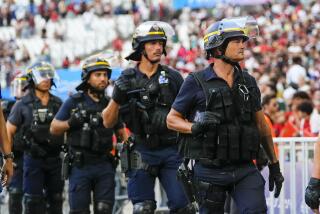Applaud This Nonevent
- Share via
Most national security intelligence is elusive, a connecting of dots -- intercepted telephone calls, overheard conversations, confessions by people who know fragments of a plan. The result may be an unprovable negative: an event that does not occur.
Thus it was when U.S. officials warned French counterparts about hints that an Air France plane would be used to attack Los Angeles on or around Christmas. The French heeded American requests and canceled six flights, and Los Angeles celebrated a peaceful holiday. Some inconvenience resulted, but how could security personnel have failed to act? The use of commercial airliners as bombs to kill thousands of people on 9/11 demands that credible threats be taken seriously.
U.S. officials painted a persuasive picture of this week’s threat. The warnings included a specific reference to Air France Flight 68 and the inclusion on the passenger list of the names of people linked to Al Qaeda. Osama bin Laden’s terrorist group thrives on attacks against symbolic targets like the Pentagon and the World Trade Center. Its target list is long thought to have included Los Angeles; in December 1999 a suspected member of the group was arrested at the Canadian border, carrying explosives apparently for an attack on Los Angeles International Airport.
However, a French official said searches and questioning of several Flight 68 passengers turned up nothing special and resulted in no arrests. A U.S. source said the interrogations might have produced leads to be used later. Of course, terrorists may have been warned off. But the lack of suspects and physical evidence also illustrates the biggest problem of intelligence-based actions: They require faith in both the motive and ability of the intelligence-gatherers. The cancellation of the Air France flights was at least a specific action, not just a vague terror alert on air travel accompanied by recommendations that the public go ahead and travel.
Israel demonstrates other difficulties in battling terror. Its intelligence agencies stop many suicide attacks, but not all. Officials said that after an Oct. 4 bombing in Haifa that killed 21 people they foiled several dozen other would-be terror attacks. Then, Thursday, a lull ended as a man with a bomb killed himself, an Israeli teenage girl and three Israeli soldiers at a bus stop in a Tel Aviv suburb. Israel then issued a spate of attack alerts.
There is always the danger that too many security alerts will desensitize people to threats. And heavy-handed precautions can cause massive disruption, a terrorist goal. So far neither has happened in the United States. From shortly after Sept. 11, 2001, until this week, security at LAX was not especially burdensome. But the U.S. remains a tempting terrorist target.
Nations united to fight terror must continue to cut off the funds of groups like Al Qaeda, arrest their members and dismantle their networks. Until those goals can be better accomplished, the alternative is the hooded vagueness of intelligence-based warnings -- and the discomfort of not knowing what to fear or how seriously to fear.
More to Read
Sign up for Essential California
The most important California stories and recommendations in your inbox every morning.
You may occasionally receive promotional content from the Los Angeles Times.










